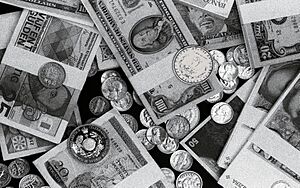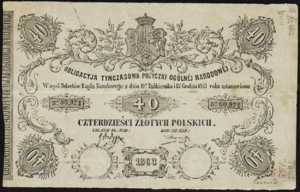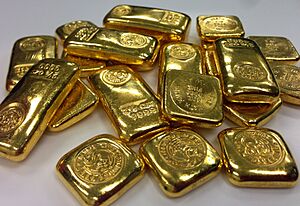Store of value facts for kids
A store of value is anything that keeps its worth over time. It's like a special piggy bank for your money or valuable items. You can save it today and expect it to be just as useful, or even more useful, when you use it later.
In modern times, the most common stores of value are money, different types of currency, or valuable things like precious metals (like gold) or financial capital (like investments). The main idea behind a store of value is to manage risk. This means you want to be sure that what you save today will still be valuable in the future.
Money as a Good Store of Value
Money is very good at being a store of value. It's one of the three main jobs of money. The other two jobs are:
- Being a medium of exchange: This means money is used to buy and sell things easily, so you don't have to trade items directly (like trading a chicken for a pair of shoes).
- Being a unit of account: This means money helps us measure the value of different goods, services, and debts using the same unit (like saying something costs $10).
Money is great for storing value because it generally keeps its purchasing power (how much you can buy with it). It's also useful because it lasts a long time.
People often save large amounts of money because it works well as a store of value. However, if inflation happens (meaning prices go up a lot), money's ability to store value can decrease. This is because your money won't buy as much as it used to.
When a country's money loses its value quickly, people might spend their income right away instead of saving it. If a currency is expected to lose its future buying power, it stops working well as money. This can make people start using money from other countries instead.
Other Ways to Store Value
Besides regular money, many other things can act as a store of value. These are called assets. Here are some examples:
- Financial Assets: These include things like stocks (parts of a company), bonds (loans you give to a government or company), and investment funds (where many people pool their money to invest).
- Real Estate: This means land and buildings, like owning a house or rental properties.
- Commodities: These are raw materials like natural gas or soybeans. You can invest in them, often through financial markets.
- Precious Metals: Things like gold coins, platinum, or silver bars have been used as stores of value for thousands of years because they are rare and don't easily wear out.
- Collectibles and Art: Rare items like gemstones, antiques, special coins, paintings, or even fine wines can increase in value over time.
Some other forms of currency can also be stores of value, such as cryptocurrency (like Bitcoin), or even livestock (animals) in some older cultures.
While some of these assets might not be easy to trade every day, and their value can go up and down, they are usually expected to keep some value even in tough times. For example, land and houses are generally good stores of value, but it might take time to sell them.
Gold and other precious metals are often preferred over industrial commodities (like oil or copper) as stores of value. This is because gold is rare and always in demand, which means its value is less likely to drop suddenly if more of it is found or produced.
The role of cryptocurrencies as a store of value is still being discussed. Some people compare Bitcoin to gold because of its limited supply. However, cryptocurrencies can be very volatile, meaning their price can change a lot very quickly. This makes some people worried about using them as a long-term store of value.
See also
- Bretton Woods system
- Constant purchasing power accounting
- Full-reserve banking
- Great Depression
- Official gold reserves
- Value network
 | Madam C. J. Walker |
 | Janet Emerson Bashen |
 | Annie Turnbo Malone |
 | Maggie L. Walker |




